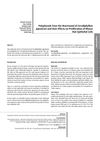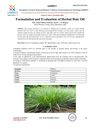 12 citations,
January 2007 in “Acta dermato-venereologica”
12 citations,
January 2007 in “Acta dermato-venereologica” Europe needs a clear system to watch over cosmetics for safety and to make sure product claims are true.
 5 citations,
November 2017 in “Asian journal of pharmaceutical and clinical research”
5 citations,
November 2017 in “Asian journal of pharmaceutical and clinical research” Pakis Gajah (Angiopteris evecta) water extract may promote hair growth in rabbits, but more research is needed for human use.
 26 citations,
October 2017 in “Scientific reports”
26 citations,
October 2017 in “Scientific reports” A special microbe helps plants absorb rock phosphate by growing on their root hairs.
 25 citations,
July 2017 in “Archives of Dermatological Research”
25 citations,
July 2017 in “Archives of Dermatological Research” Herbal products might promote hair growth with fewer side effects, but more research is needed to confirm their safety and effectiveness.
 36 citations,
September 2019 in “Journal of Herbal Medicine”
36 citations,
September 2019 in “Journal of Herbal Medicine” Herbal nano-formulations show potential for effective skin delivery but need more research.
 12 citations,
February 2014 in “Recent Patents on Inflammation & Allergy Drug Discovery”
12 citations,
February 2014 in “Recent Patents on Inflammation & Allergy Drug Discovery” Shampoos have evolved into multifunctional products with patented innovations for different hair needs and can include medicinal herbs for hair and scalp health.
 10 citations,
January 2022 in “Scholars international journal of anatomy and physiology”
10 citations,
January 2022 in “Scholars international journal of anatomy and physiology” Aloe Vera gel helps heal skin, treats skin conditions, and can stimulate hair growth due to its various healing properties.
 January 2023 in “Biocell”
January 2023 in “Biocell” Safflower extract helps protect hair follicle cells from damage caused by chemotherapy.
 January 2024 in “International Journal of Research Publication and Reviews”
January 2024 in “International Journal of Research Publication and Reviews” The herbal hair serum with rosemary, hibiscus, and neem is safe and effective for hair care.
 3 citations,
January 2022 in “Precision medicine and clinical omics”
3 citations,
January 2022 in “Precision medicine and clinical omics” Beta-sitosterol and stigmasterol might help prevent hair loss by blocking a specific enzyme.
 5 citations,
January 2012 in “Biological & Pharmaceutical Bulletin”
5 citations,
January 2012 in “Biological & Pharmaceutical Bulletin” Hura crepitans and its compound daphne factor F3 may help treat hair loss by blocking a specific hair growth inhibitor.
 January 2023 in “Brazilian Journals Editora eBooks”
January 2023 in “Brazilian Journals Editora eBooks” Girls with Autism Spectrum Disorder may show different symptoms than boys, leading to missed or delayed diagnoses.
 January 2023 in “Brazilian Journals Editora eBooks”
January 2023 in “Brazilian Journals Editora eBooks” Psychiatrists are crucial in pain management teams because they help treat severe pain and related mental health issues.
 36 citations,
December 2002 in “Experimental dermatology”
36 citations,
December 2002 in “Experimental dermatology” Barley extract, specifically procyanidin B-3, can promote hair growth and counteract growth inhibition.
54 citations,
September 2002 in “Annals of Pharmacotherapy” Herbal treatments can help with early-stage BPH symptoms, but more research is needed.
 26 citations,
November 2002 in “Planta medica”
26 citations,
November 2002 in “Planta medica” Extracts from Cercidiphyllum japonicum wood can stimulate mouse hair cell growth like common hair growth treatments.
 13 citations,
January 1991 in “Dermatology”
13 citations,
January 1991 in “Dermatology” Minoxidil helps hair growth in people with monilethrix without side effects.
 17 citations,
May 2018 in “PeerJ”
17 citations,
May 2018 in “PeerJ” VB-1, a natural compound, may promote hair growth by enhancing a key cell growth pathway.
 13 citations,
October 2017 in “Biomedicine & Pharmacotherapy”
13 citations,
October 2017 in “Biomedicine & Pharmacotherapy” Eclipta alba extract may help treat obesity by blocking fat cell formation and lowering blood lipid levels.
 48 citations,
January 2017 in “Skin Pharmacology and Physiology”
48 citations,
January 2017 in “Skin Pharmacology and Physiology” Finasteride-loaded nanoparticles may help treat alopecia.
 31 citations,
January 2017 in “Phytotherapy Research”
31 citations,
January 2017 in “Phytotherapy Research” Ziziphus jujuba Mills may have health benefits, but more research is needed to confirm its safety and effectiveness.
 1 citations,
January 2018 in “Acta dermatovenerologica Alpina, Pannonica et Adriatica (Tiskana izd.)”
1 citations,
January 2018 in “Acta dermatovenerologica Alpina, Pannonica et Adriatica (Tiskana izd.)” The herbal extract was found to effectively reduce and prevent hair loss without any side effects.
 38 citations,
January 2013 in “Analyst”
38 citations,
January 2013 in “Analyst” The study found that Ziziphus jujuba seeds contain beneficial compounds for treating insomnia and anxiety and that the methods used are effective for assessing their quality.
 March 2017 in “Fundamental & Clinical Pharmacology”
March 2017 in “Fundamental & Clinical Pharmacology” The model and estimator can predict drug exposure in kidney transplant patients well.
 30 citations,
January 2000 in “Dermatologic Clinics”
30 citations,
January 2000 in “Dermatologic Clinics” Finasteride and minoxidil are effective FDA-approved treatments for androgenetic alopecia.
49 citations,
November 2021 in “Annual review of pathology” Lysophospholipids like LPA and S1P are important for hair growth, immune responses, and vascular development, and could be targeted for treating diseases.
 3 citations,
October 2024 in “International Journal of Advanced Research in Science Communication and Technology”
3 citations,
October 2024 in “International Journal of Advanced Research in Science Communication and Technology” Lemongrass hair oil is effective for hair growth and scalp health.
1 citations,
February 2022 in “Research journal of pharmacy and technology” Wrightia tinctoria extract may promote hair growth better than minoxidil.
 1 citations,
January 2017 in “Social Science Research Network”
1 citations,
January 2017 in “Social Science Research Network” The document suggests creating a secure database for indigenous knowledge and recommends that the TKDL actively fight patents that slightly alter traditional knowledge.
 22 citations,
July 2017 in “BMC complementary and alternative medicine”
22 citations,
July 2017 in “BMC complementary and alternative medicine” Natural remedies for hair and scalp issues are still widely used in Palestine.



























